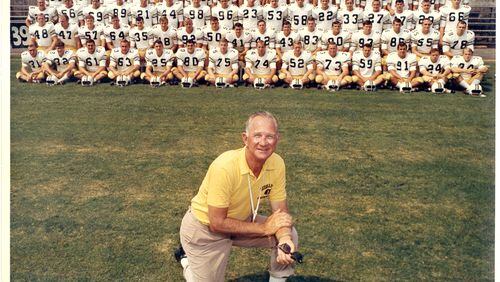It was 50 years ago this month that Georgia Tech coach Bobby Dodd retired after 22 years and 165 wins. The news, broken by the Atlanta Journal’s Furman Bisher on February 6, came as a surprise. There had been hints and speculation that he would indeed step down, but then in days leading up to his decision, he told two news outlets – including the Atlanta Constitution – that he planned to coach for four or five more years.
Dodd's comments to a Chicago Tribune columnist a few days later indicate that in 50 years, some things haven't changed that drastically at Tech. For one thing, Dodd shared the history of his renowned "belly series," a forerunner of the spread-option offense that coach Paul Johnson runs now.
Dodd: “The ‘belly’ went farther than a mere fake. The quarterback actually left the football in the fullback’s belly for a couple of steps and then, when the offense was committed (edit: he may have said or meant defense), withdrew the ball and made a pitchout.”
(Dodd learned it at an all-star game from an All-American quarterback named Eddie LeBaron, who later would serve as the Falcons’ general manager 1983-85.)
More germane are the recruiting challenges that Dodd described.
“Standards are higher, and it is more difficult to enroll the outstanding athlete. We haven’t had a strong freshman team for three years. At Georgia Tech, the problem was compounded because we don’t have the variety of courses available at other tech schools. I saw that we could hold our own against many schools, such as Army, Navy, Tulane, Duke and Notre Dame. But we couldn’t enroll all the talent available to state universities. What we must do now is recruit farther away from home. We can’t qualify all our area boys, and we have to compensate. Let’s say that I certainly didn’t relish the pressure of trying to recruit a championship team under conditions that do not favor a school with high academic standards.”
The book “Dodd’s Luck,” written by Dodd and longtime AJC writer Jack Wilkinson, cited “Dodd’s growing dissatisfaction with Tech academic policies that inhibited his recruiting” as a factor in his decision to retire, along with health issues. (He was 58 at the time of his retirement.)
Fifty years later, Johnson would likely agree with Dodd’s primary premise, that “conditions do not favor a school with high academic standards.” Challenges specific to Tech are still in place, namely the rigorous curriculum and the limited number of majors. One thing that Johnson has said often is that Tech is not for everyone, particularly for recruits looking for an easy time academically and 80,000-seat stadiums.
Interestingly, two wire stories on the following page of the Tribune section had updates on the job search in the wake of Dodd's retirement. One reported that Tech was seeking to speak with Tennessee coach Doug Dickey, who had just finished his third year with the Volunteers. He had previously been an assistant to Arkansas coach Frank Broyles, who was a Tech grad and longtime assistant to Dodd. Evidently, Dickey passed. (For that matter, Broyles was Dodd's choice, but he acknowledged that there wasn't "one chance in a million" that he would leave Arkansas, where he had already won a national championship.)
Another story reported that Miami coach Charlie Tate, who had previously been an assistant at Tech for Dodd, took himself out of the running for the job. In his third season, Tate had just led the Hurricanes to an 8-2-1 season and a top-10 finish, which proved to be the peak of his seven-season tenure.
Tech ultimately hired Bud Carson, who had served for one season as Dodd’s defensive coordinator in 1966. Carson was fired after a 6-6 season in 1971. (He went on to be the defensive coordinator for the Pittsburgh Steelers, gaining wide renown as the architect of the “Steel Curtain” defense.)
Carson was a first-time head coach, another pattern. After Carson, Bill Curry and George O'Leary were also first-time head coaches. Carson's successor, Bill Fulcher, had coached one year at Tampa (the college, not the NFL team) before his hire at Tech.
In 50 years, Tech has changed plenty. In some ways, it hasn't changed much at all.
About the Author







